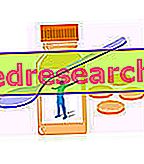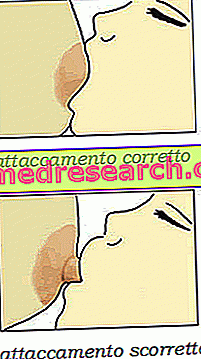Definition
Also called angiocolitis or choledocyte, cholangitis is defined as an inflammation of the bile ducts and extrahepatic pathways, the cause of which lies, most often, in a bacterial insult. When the inflammation is accompanied by a scarring and a thickening of the bile ducts, one speaks more precisely of primary sclerosing cholangitis (in reference to a chronic inflammation of the bile ducts).
Causes
Most cholangitis depends on bacterial infections ( Escherichia coli, streptococci, salmonella, Pseudomonas, etc.) or parasitic infections ( Ascaris lumbricoides or Clonorchis sinensis ), an expression, in turn, of calculations or mechanical obstructions of the pathways bile. Only rarely, cholangitis is the result of pathologies of the digestive system (appendicitis, duodenal diverticula, fistulas in the intestine, etc.). The infection responsible for cholangitis can also be the consequence of surgical injuries. Rare, albeit possible, toxic pancreatic reflux cholangitis.
Symptoms
It is not possible to describe exactly the symptoms that characterize the cholangitis, since they are influenced by the causative agent and the severity of the condition. In general, the most frequent symptoms include: chills, diarrhea, digestive difficulties, abdominal pain, intermittent fever, jaundice, general malaise, nausea, weight loss, vomiting.
Information on cholangitis - cholangitis treatment drugs is not intended to replace the direct relationship between health professional and patient. Always consult your doctor and / or specialist before taking cholangitis - cholangitis treatment drugs.
drugs
Considering that, in most cases, cholangitis is the result of a bacterial attack, antibiotics are certainly the most appropriate drugs: by removing the pathogen, the inflammation of the bile ducts vanishes. Clearly, we have analyzed that cholangitis is closely associated with an obstruction of the bile ducts (eg calculations), therefore the treatment also and above all involves the cure of the underlying cause: only in this way, the pathology can be completely reversed, ensuring thus the healing of the patient.
Despite the fact that cholangitis can be resolved with rather simple therapeutic strategies, it is essential to intervene promptly: in fact, when untreated, the disease can degenerate into very serious complications, to the point of jeopardizing the subject's very life: liver abscess, secondary biliary cirrhosis, renal failure and septic shock.
Antibiotic drugs for the treatment of cholangitis : the choice of antibiotic is always dependent on the pathogen that triggered the infection.
- Levofloxacin (eg Levofloxacin, Tavanic, Aranda, Fovex): belonging to the class of quinolones, levofloxacin is useful for treating cholangitis dependent on a streptococcal infection. Indicatively, take 500 mg of the drug orally or intravenously, once a day, for a week, unless further instructions from the doctor.
- Procaine + penicillin: this is a pharmacological preparation formulated with a penicillin associated with an anesthetic, which is also indicated for the treatment of cholangitis dependent on a streptococcal infection: it is recommended to take 600-1000 units of drug per day via intramuscular, for at least 10 days. Benzathine (eg Fatromicin) can also be associated with this antibiotic.
- Cipro (eg Ciprofloxac, Samper, Periactin): the drug belongs to the class of fluoroquinolones and is used in therapy for the treatment of cholangitis dependent on an E. coli infection. It is recommended to take 500 mg of drug (tablets) every 12 hours; the duration of the therapy is 5-7 days. Consult your doctor.
- Azithromycin (eg Azithromycin, Zitrobiotic, Rezan, Azitrocin): it is a macrolide antibiotic, indicated for the treatment of cholangitis dependent on E. coli-sustained infections. In the form of immediate-release tablets, it is recommended to take 500 mg of the drug on the first day, followed by 250 mg of the active drug in the following 4 days. Consult your doctor for more information.
- Cefotaxima (eg. Cefotaxima, Aximad, Lirgosin, Lexor): to treat infections caused by Pseudomonas and salmonella in the context of cholangitis. Indicatively, take 1-2 grams of drug intravenously or intramuscularly every 8 hours for 14 days.
- Gentamicin (eg. Gentamicin, Ciclozinil, Genbrix, Gentalyn): aminoglycoside antibiotic. For the treatment of Pseudomonas aeruginosa cholangitis, it is recommended to administer 2 mg / kg of drug (loading dose) followed by 1.7 mg / kg IV every 8 hours; alternatively, administer 5 mg / kg (after the loading dose) every 24 hours. Continue with this dosage for 2 weeks.
Pain-relieving and antispasmodic drugs for pain control : cholangitis is always accompanied by pain, therefore, when excessive, it may require the administration of relaxing muscle and anti-inflammatory drugs:
- Meperidine or Petidina (eg Demerol, Petid C): opioid analgesic drug to be taken orally at a dose of 50-100 mg every 4 hours, as needed. Or, intramuscularly / intravenously or subcutaneously, at a dosage of 25-100 mg every 4 hours. Alternatively, for slow intravenous infusion, it is recommended to administer the drug at a dose of 25-50 mg (repeat after 4 hours). The dosages just described are indicated to mask the pain that cholangitis involves.
- Diclofenac (eg Fastum Painkiller, Dicloreum): preferable to pethidine. Take 50 mg of drug orally 3 times a day (tablets); in some patients, an initial dose of 100 mg is required, and then changed to 50 mg. After the first day, the total daily dose should not exceed 150 mg.
- Scopolamine butylbromide (eg Buscopan, Addofix, Erion): the drug is indicated to relax the smooth muscle of the genitourinary tract. It is recommended to take 1-2 tablets of 10 mg 3 times a day for adults and children over the age of 14 years. The drug is also indicated to quell vomiting in the context of cholangitis. In the case of children between the ages of 6 and 14, it is essential to consult a doctor before taking the drug.
- Belladonna and papaverine clohydrate (eg colic antispasmin): the belladonna has an anticholinergic action, reducing the spasm of the smooth muscles (significant reduction of pain). Take 2-6 sugared almonds - consisting of 10 mg of papaverine and 10 mg of belladonna - per day for the average pain caused by cholangitis. In case of severity, take 1-3 tablets of 50 mg of papaverine and 10 mg of belladonna per day.
Drugs to treat nausea and vomiting in the context of cholangitis : pain affecting the biliary tract could manifest itself so intensely that it induces nausea and vomiting; therefore, the administration of anti-emetic drugs can help alleviate these secondary symptoms. Antiemetics do not help in any way to cure the triggering cause. In this category, in addition to the previously analyzed scopolamine, we recall:
- Metoclopramide (eg Plasil): belongs to the class of dopamine receptor blockers. It is an antiemetic drug and stimulates intestinal motility, also indicated to promote intestinal peristalsis and digestion. Parenterally, take 10 mg of drug, three times a day, preferably before meals. Also available in tablets and syrup.
- Domperidone (eg. Motilium, Peridon): the drug is a stimulant of intestinal motility for the treatment of vomiting. It is recommended to take the drug at a dose of 10-20 mg, 3-4 times a day, orally. Do not exceed 80 mg. The drug is also available in the form of 60 mg suppositories: apply 2 suppositories per day, as needed. It is also indicated for the treatment of vomiting associated with chemotherapy.
- Perfenazine (eg. Trilafon): in the event of nausea and / or vomiting in the context of cholangitis, it is recommended to take the drug at a dose of 8-16 mg, fractionated in several doses during the 24 hours.
For further information: see the article on drugs for the treatment of vomiting
Other drugs used in therapy for the control of cholangitis symptoms : cholangitis often occurs with an alteration in the color of the skin, mucous membranes and sclera, which take on a yellowish color.
- Ursodeoxycholic acid or ursodiol (eg Ursobil HT, Ursodes AGE acid, Litursol): the administration of these drugs has been particularly indicated for the dissolution of gallbladder cholesterol stones, especially if associated with jaundice and bile duct inflammation ( cholangitis). The recommended dosage is the following: 8-12 mg / kg per os per day, in a single dose, in the evening or in two divided doses; prolong the therapy up to two years (maintenance therapy: 250 mg a day). Respect for the drug's use is essential for healing the disease (calculations) and for canceling side effects (in this case, jaundice). Consult your doctor.
- Chenodeoxycholic acid: it is the most important bile acid produced by the liver. The active ingredient is used in therapy to help dissolve gall bladder stones, even in the context of jaundice and cholangitis; the treatment with this drug is able to dissolve, partially or totally, the gall bladder stones (consisting of cholesterol), thus resolving the jaundice dependent on gallbladder calculi, therefore from cholangitis (in this specific case).



